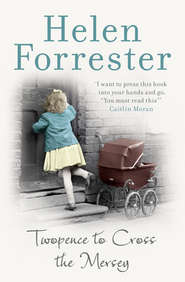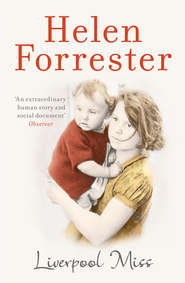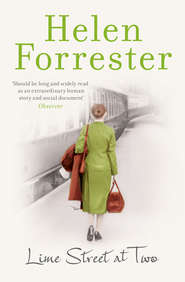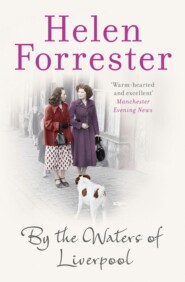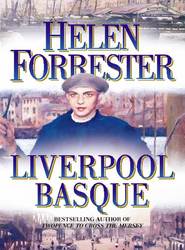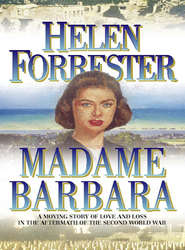По всем вопросам обращайтесь на: info@litportal.ru
(©) 2003-2024.
✖
The Complete Helen Forrester 4-Book Memoir: Twopence to Cross the Mersey, Liverpool Miss, By the Waters of Liverpool, Lime Street at Two
Настройки чтения
Размер шрифта
Высота строк
Поля
At first, Edward used to cry with hunger, but as he grew a little older, he would lie lethargically in the Chariot, making no sound most of the time. The other children also grew apathetic and the smaller ones tried to take bits of bread when I was not looking. We never heard from the school about their progress nor did my father inquire.
One morning my parents went out quite early, before Edward had been fed. After the children had been given a meagre bowl of porridge each and had been sent to school, there was no food left in the house. I was desperate with hunger. And the usual pint of milk would, I knew, not be enough to last Edward for twenty-four hours. However, clutching the shilling, I wrapped Edward up in his stinking blanket, put on my woollen cardigan, my coat being still in pawn, and went downstairs to buy milk from the first passing milkman.
Standing on the doorstep were two pint bottles of milk, presumably delivered for Miss Sinford, the lady with religious mania, and Mrs Hicks, who lived with her unemployed husband in the bowels of the basement. The other tenants patronized a milkman who came later.
I looked at the bottles and then up and down the apparently empty street, hoping that the milkman might still be near by. There was no sign of him, however, and I turned back into the house with the idea of getting out the Chariot and wheeling it round to the dairy to purchase Edward’s precious pint.
Edward began to whimper. I looked down longingly at the milk bottles. Then, like a fleeing cat, I tore up the stairs, Edward bobbing up and down in my arms. I laid him down gently in the Chariot, took our two cracked cups, ran down to the bathroom and filled one with water, then ran silently down the rest of the stairs to the front door.
I glanced quickly up and down the street. Everyone was apparently sleeping the long hopeless sleep of the unemployed.
Quickly I took the lids off the bottles, filled the empty cup with a little milk from each bottle, topped the bottles up with water, carefully replaced the lids, shook the bottles gently, and then crept upstairs again with my precious prize.
I managed to make a feed for Edward before the little fire I made from paper flickered out, and I fed him contentedly, knowing that I could make the pint of milk I would buy stretch further for him. I had no qualms of conscience about my theft – I thought only of Edward – and I was mercifully unaware that the policeman on the beat had quietly watched the whole operation.
It was late February, with days of pouring rain interspersed with weak sunshine. The trees and bushes in the locked gardens in the squares were beginning to show a faint swelling of their buds, and, as I wheeled Edward to the tiny local grocery shop and to the greengrocer’s each day, I would wonder why the children running in and out of the traffic or playing with cigarette cards on the pavement could not be allowed to play in the gardens. I would stand watching them dully as they cursed and tumbled each other about, their white or black skins equally grey with dirt and dust, their noses dribbling, their bare legs chapped and with septic sores on their knees. Little girls would play endless games of skipping and hopscotch, each with its appropriate song, learned from their elder sisters and passed down from generation to generation.
‘I am a girl guide dressed i’ blue,These are the actions I must do.Salute to the King, bow to the QueenAnd turn my back to the people.Pepper!’
And at the word ‘pepper’ they would turn the skipping-rope with feverish speed to see how many fast skips they could do before being tripped up. Sometimes, I would wish wistfully that I might be able to join in, but I had always to watch Avril and Edward and I was mortally afraid of something happening to them in this strange world which I did not understand.
Another pleasure was to stand in front of the greengrocer’s and contemplate the neat pyramids of oranges, apples, lemons and tomatoes. Mentally, I ate my way through the piles from top to bottom. I lacked the courage and initiative of the little street arabs, who would sometimes snatch a piece of fruit and fly like jets down the narrow back alleys, there to consume it with much ribaldry at the expense of the outraged greengrocer. A cry of ‘Bobby’ or ‘Cop’ or ‘Flattie’ would, however, send them speeding off again, old gym shoes or bare feet thudding over the flagstones like rapidly bouncing rubber balls.
With Edward replete with Miss Sinford’s and Mrs Hick’s milk and sleeping quietly in the Chariot, Avril and I went on the usual shopping round. At the greengrocer’s I stood and dithered. If I bought rice, I argued with myself, Mother would say that I should have bought potatoes; if potatoes, then she would say rice. I knew I could not win. Mother was getting better and her increasing irritability at my sins was a sign of it
The policeman on his beat stopped and chucked Edward under his chin. Edward opened his eyes and managed a small smile. I looked up and smiled too, my morning peccadillo completely forgotten.
‘Nice baby you’ve got,’ he said, putting his hands behind his back and rocking gently on his heels. He beamed at me from under his helmet. ‘What’s his name?’
‘Edward,’ I said. He was a nice-looking young man, neat and clean, despite the acne spots all over his face.
‘And what’s your name?’
‘Helen,’ I replied promptly.
He looked down at the baby again, while the greengrocer peered through the glass of his window, which he had been polishing.
‘No Mummy?’
‘Yes, she’s looking for work. So’s Daddy.’
He looked surprised, apparently at my clear English, so different from that of the other children round about. It was better English than he spoke himself.
‘Having a hard time? Got any other brothers and sisters?’
‘Yes,’ I said simply, in answer to the first question. ‘We are seven. The others are all at school.’
The wind was getting up and it was beginning to rain. My teeth started to chatter and I wrapped my cardigan closer round me.
The policeman stared at me with calm blue eyes and said, ‘Humph.’ He adjusted the collar of his cape. I became aware of the interested gaze of the greengrocer, and decided on rice for supper.
‘Goodbye,’ I said to the policeman and pushed the pram a bit farther along the street and parked it outside the grocery shop, where Avril watched it while I went inside. The policeman, after a moment’s hesitation, went into the greengrocer’s shop.
The following morning a pint of milk was delivered to the top landing of our staircase. When I ran downstairs to catch the milkman and return the bottle to him, he insisted that it was for Edward and was sent by a friend, and not even Father could make him say any more. For two long intolerable years the milkman stolidly climbed the stairs and deposited a pint of milk on our top step. It probably saved Edward’s life.
Many years later, the greengrocer told my mother about the young policeman who had inquired about us from him, and had then gone round to the dairy and ordered a daily pint of milk to be delivered for Edward, and had paid for it out of his own meagre wages.
CHAPTER TWELVE (#ulink_2e67df85-ad77-55b8-b291-bfcac2ec8459)
One of the advantages of being very poor is that one has time. Since we had no clothes except those on our backs, there was no pile of washing to be dealt with each Monday. When there is little food, there is little cooking, and since we possessed no bed linen, towels, cleaning materials or tools, most other domestic jobs either were non-existent or could not be carried out. As the weather improved, therefore, I began to take a walk each day, pushing Edward and Avril in the Chariot.
These were, for me, voyages of discovery into a world I had never dreamed of before. I meandered along narrow streets, where the soot-blackened early Victorian houses opened directly upon the pavement. Some of the houses had the flagstone across their front door scrubbed and neatly whitened, with a strip of well-shone brass covering the sill; their painted window-sills were carefully polished and their garish chintz curtains were starched as stiff as the sentries outside Buckingham Palace. Others were like our house: dull windows veiled in grey webs of lace, window-panes missing and filled in with cardboard, old orange-peel and cigarette-ends littering their frontage.
The local pawnbroker’s shop, with its dusty sign of three golden balls hanging outside over a wooden table piled high with second-hand clothing, made for me a fascinating treat. I loved to gaze in the windows at the rows of Victorian and Edwardian rings for sale, the war medals, violins, blankets, china ornaments and sailors’ lucky gold charms.
The pawnbroker himself was part of the scene, as he stood in his doorway puffing at a cigarette, shirt-sleeves rolled up to show olive-coloured arms, tight black curls receding from his forehead, a magnificent watch-chain with dangling seals swathed across a wrinkled, blue serge waistcoat over a comfortable paunch.
‘Come on, me little blue-eyed duck!’ he would call to Avril when he saw her, and occasionally he would feel around in his waistcoat pocket with his tobacco-stained fingers to dig out a grubby sweet for her. She loved him and would howl dismally on the days when we did not walk that way. For me, he would have a polite nod and a brief Afternoon. Nice day’, regardless of whether it rained or shone.
One mild March afternoon, I circled the cathedral and listened to the ring of the stonemasons’ tools on its great sandstone walls. It rose like a graceful queen above slums which put Christianity to shame. I stared up the beautiful sweep of steps leading to its entrance, wondering if I dare go in, but I was too afraid. I had not seen myself in a mirror since coming to Liverpool, but I knew I was both dirty and shabby. My hat and shoes had been passed to Fiona, who was obliged to go out to school, whereas I could stay indoors. The shoes had been replaced by a pair of second-hand running shoes with holes in the toes; my head was bare and my hair straggled in an unruly mass down my neck; it was rarely combed and never washed.
Still pushing aimlessly, I wandered along Rodney Street, a lovely street of well-kept Georgian houses, the homes and surgeries of Liverpool’s more eminent doctors. A brass plaque on No. 62 informed me that Gladstone was born there. Mr Gladstone was not one of my heroes, so I continued onward enjoying the peace and orderliness of the quiet road.
I turned down Leece Street, past the employment exchange where Father spent so many unhappy hours, past tall, black St Luke’s Church and into Bold Street, the most elegant shopping centre in Liverpool. Although there were at least a dozen empty shops up for rent, the atmosphere was one of opulence. I pushed past women in fur coats and pretty hats, who stared at me in disgust, to look in windows which held a single dress or fur or a few discreet bottles of perfume. A delicious odour of roasting coffee permeated the place.
Onward I went, through the packed shopping area of Church Street, where trams, nose to tail, clanged their way amid horsedrawn drays, delivery vans and private cars, and newspaper men shouted to me to ‘read all abaat it’. The cry of ‘Echo, Echo, Liverpool Echo, sir’ comes wafting down the years, like the overwhelming scent of vanilla pods, the sound and smell of a great port.
‘I know where we’ll go,’ I said to Avril, who was bouncing up and down in the Chariot pretending it was a horse.
‘Where?’
‘We’ll go down to the Pier Head!’
I knew this part of the town, because I had been shopping in it on many occasions with my grandmother. I pushed the Chariot purposefully up Lord Street to the top of the hill, where Queen Victoria in pigeon-dropped grey stone presided, down the hill, through a district of shipping offices with noble names upon their doors: Cunard, White Star, Union Castle, Pacific & Orient, the fine strands which tied Liverpool to the whole world. Past the end of the Goree Piazzas, an arcade of tiny shops and offices, where out-of-work sailors lounged and spat tobacco and called hopefully after me, under the overhead railway which served to take the dockers to work, and a last wild run across the Pier Head, dodging trams and taxis, to the entrance to the floating dock.
At last I had found it!
The river scintillated in the sunshine; a row of ships was coming in on the tide; a ferry-boat and a pilot-boat tethered to the landing-stage rocked rhythmically; screeching gulls circled overhead and swooped occasionally to snatch food from the river. A cold wind from the sea tore at my cardigan, jostling and buffeting my skinny frame. I put the hood of the Chariot up to shield Avril and Edward from it.
The shore hands were casting off the ferry-boat, and I looked wistfully out across the water at the empty Cammell Laird shipyards in Birkenhead. My eyes followed the shore along to the spires of Wallasey, and mentally I followed the railway with all its dear familiar station names along the coast to West Kirby. On that railway-line lived Grandma, who was so angry with Father that she never wrote to us. There was a middle-class world, where people could still wash every day in clean bathrooms. The slump had reached some of them, I guessed; but once past Birkenhead, I thought sadly, it could not be half as miserable as Liverpool was. Perhaps, if I could see Grandma and describe to her my mother’s terrible suffering and my father’s despair, she would forgive them and help them.
I longed to push the Chariot up the ramp of the ferry-boat and escape, run away from our smelly rooms, from hunger and cold, the cold which was raking through me mercilessly now, and from people who looked like the gargoyles on the old cathedrals I had attended in the past.
‘The ferry costs twopence,’ I reminded myself, as I wrapped Avril and Edward closer in their inadequate piece of blanket, ‘and you haven’t got twopence.’ Furthermore, Grandma, though long since widowed, had been married to a businessman who never failed, and who had come from a long line of ironmasters and merchants who always seemed to have done very well for themselves – she just would not understand.
The way home seemed incredibly long, and I paused at the bottom of Bold Street, to stand for a moment in the warmth of a shop doorway before continuing. A shopwalker behind the glass door frowned at me as I hauled the Chariot close in. The shoppers were thinning out rapidly and I watched them hurrying to their cars, parked at the kerb, or into Central Station. And there she was!
Joan! My own best friend!






